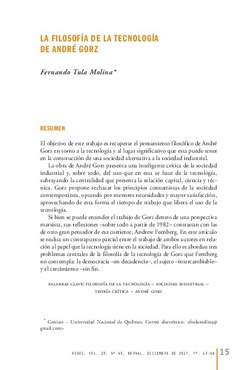La filosofía de la tecnología de André Gorz

Ver/
Fecha
2017-12Autor
Tula Molina, FernandoResumen
El objetivo de este trabajo es recuperar el pensamiento filosófico de André Gorz en torno a la tecnología y al lugar significativo que esta puede tener en la construcción de una sociedad alternativa a la sociedad industrial.
La obra de André Gorz presenta una inteligente crítica de la sociedad industrial y, sobre todo, del uso que en esta se hace de la tecnología, subrayando la centralidad que presenta la relación capital, ciencia y técnica. Gorz propone rechazar los principios consumistas de la sociedad
contemporánea, optando por menores necesidades y mayor satisfacción,
aprovechando de esta forma el tiempo de trabajo que libera el uso de la tecnología.
Si bien se puede entender el trabajo de Gorz dentro de una perspectiva marxista, sus reflexiones –sobre todo a partir de 1982– contrastan con las de otro gran pensador de esa corriente, Andrew Feenberg. En este artículo se realiza un contrapunto parcial entre el trabajo de ambos autores en relación al papel que la tecnología tiene en la sociedad. Para ello se abordan tres problemas centrales de la filosofía de la tecnología de Gorz que Feenberg no contempla: la democracia –en decadencia–, el sujeto –intercambiable–y el crecimiento –sin fin. The main objective for this paper is to retrieve the philosophical thinking of André Gorz, regarding technology and about the main place that technology could have into the building of an alternate society, different than an industrial one.
The works of André Gorz show a clever critic about industrial society and, specially, about its employment of technology, stressing the central role of the relationship among capital, science and technology. Gorz suggests rejecting the consumerist values attached to contemporary societies, by choosing instead lowering needs, heighten then satisfaction, in order to take advantage of the working time released free by using technology.
Even if it’s possible to comprehend Gorz’s work within a Marxist frame, their thought –mostly since 1982 onwards, shows some contrast with that from another distinguished Marxist scholar, Andrew Feenberg.
Then, in this paper I perform a partial counterpoint among the works of Gorz and Feenberg regarding their understanding of technology’s role within society. In order to do so, I will focus on three of the main problems for Gorz’s Philosophy of Technology, not addressed by Feenberg; the democracy –which would be decaying, the subject –which would be interchangeable, and the progress –which would be never ending.
